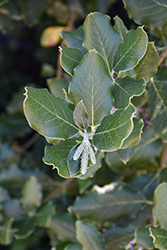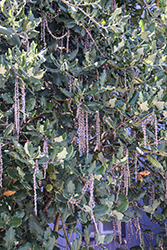It's all about ...
plants

Height: 10 feet
Spread: 10 feet
Sunlight:
![]()
![]()
Hardiness Zone: 8a
Other Names: Coast Silk Tassel, Wavyleaf Silktassel
Description:
This variety is an upright, evergreen shrub with glossy green oval leaves with a wavy margin and dense woolly coating underneath; the creamy white male catkins are longer than the female; dried catkins will persist on this bush through the summer
Ornamental Features
Silk Tassel Bush has masses of beautiful chains of white catkins with silver overtones hanging below the branches from early fall to late winter, which are most effective when planted in groupings. It has attractive dark green evergreen foliage. The glossy oval leaves are highly ornamental and remain dark green throughout the winter.
Landscape Attributes
Silk Tassel Bush is a dense multi-stemmed evergreen shrub with a more or less rounded form. Its average texture blends into the landscape, but can be balanced by one or two finer or coarser trees or shrubs for an effective composition.
This is a relatively low maintenance shrub, and should not require much pruning, except when necessary, such as to remove dieback. Deer don't particularly care for this plant and will usually leave it alone in favor of tastier treats. It has no significant negative characteristics.
Silk Tassel Bush is recommended for the following landscape applications;
- Accent
- Mass Planting
- General Garden Use
Planting & Growing
Silk Tassel Bush will grow to be about 10 feet tall at maturity, with a spread of 10 feet. It has a low canopy, and is suitable for planting under power lines. It grows at a medium rate, and under ideal conditions can be expected to live for 50 years or more.
This shrub does best in full sun to partial shade. It does best in average to evenly moist conditions, but will not tolerate standing water. It is not particular as to soil type or pH, and is able to handle environmental salt. It is highly tolerant of urban pollution and will even thrive in inner city environments, and will benefit from being planted in a relatively sheltered location. Consider applying a thick mulch around the root zone in winter to protect it in exposed locations or colder microclimates. This species is native to parts of North America.
This plant is not reliably hardy in our region, and certain restrictions may apply; contact the store for more information.

